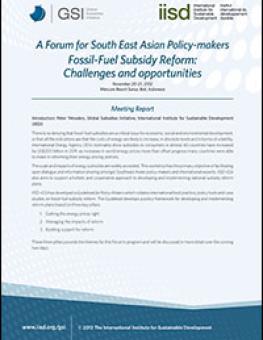
A Forum for South East Asian Policy-Makers on Fossil-Fuel Subsidy Reform: Challenges and opportunities - Meeting Report
To help share experiences on the successes and challenges with fossil-fuel subsidy reform, the IISD's Global Subsidies Initiative (GSI) convened a two-day forum for policy-makers in South East Asia, entitled Fossil-Fuel Subsidy Reform: Challenges and Opportunities.
The event brought together high-level policy-makers from Bangladesh, India, Indonesia, Malaysia, the Philippines and Vietnam, as well as a number of international policy experts from organizations including the Asian Development Bank (ADB), the United Nations Development Programme (UNDP) and the World Bank (WB).Forum discussions focused on key elements of a reform strategy: getting prices right; managing the impacts of reform; and consulting and communicating with stakeholders to build support for reform. The participants also discussed the role of international cooperation in helping to facilitate solutions at the national level. South East Asian countries have a wealth of experience to draw from, with many having partially removed subsidies during peak oil prices in 2008, and most already committed to developing and implementing reform plans.
You might also be interested in
Heatwaves to hit China once every 5 years as global extreme weather events multiply, study finds
Record-breaking heatwaves that have scorched North America, Europe and China are set to worsen in future unless the world stops burning fossil fuels, according to a study by the World Weather Attribution (WWA) academic initiative.
What the war in Ukraine means for Asia's climate goals
The queues outside petrol pumps in Sri Lanka have lessened, but not the anxiety. Asanka Sampath, a 43-year-old factory clerk, is forever vigilant. He checks his phone for messages, walks past the pump, and browses social media to see if fuel has arrived. Delays could mean being left stranded for days. "I am really fed up with this," he said. His frustrations echo that of the 22-million inhabitants of the island nation, facing its worst ever economic crisis because of heavy debts, lost tourism revenue during the pandemic, and surging costs. The consequent political turmoil culminated with the formation of a new government, but recovery has been complicated by Russia's invasion of Ukraine, and the consequent upending of global energy markets.
A Guidebook to Fossil-Fuel Subsidy Reform for Policy-Makers in Southeast Asia
Reforming Environmentally Harmful Subsidies
This playbook offers a strategic framework for philanthropic organizations to understand, engage, and advance environmentally harmful subsidies reform as a critical avenue for sustainable environmental and economic transformation.